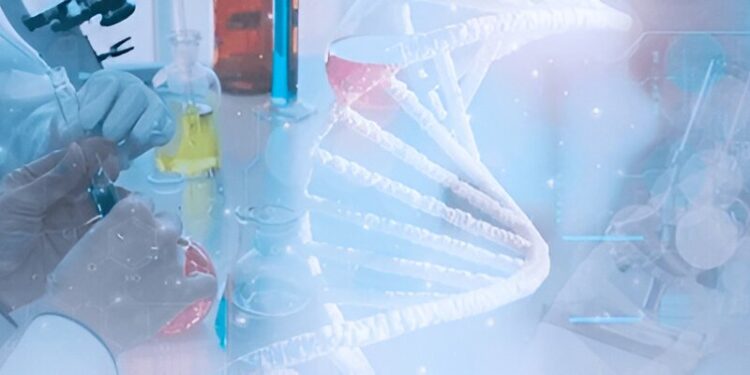1. Introduction
Surprisingly, about 5-10 % of all cancers are due to inherited gene defects. About this, it is realized that genes significantly contribute to cancers. Due to improved knowledge of genetic Testing, Testing has become a critical means of diagnosing and managing cancer. In addition, if national predispositions are proven, a man can make the right decisions and have no pathologies. More importantly, this discussion gives enough information about the Genetic Risk of Cancer. It shows why Genetic Testing is necessary and the data needed to decide whether it fits your needs and circumstances.
Table of Contents
2. Understanding the Link Between Genetics and Cancer
Cancer forms when the cells in an individual begin to multiply unrestrained, typically through gene mutations. These gene mutations also interfere with gene functioning related to cell reproduction and repair processes and cause tumour formation. Genetic mutations are primarily classified as being inherited or acquired.
Inherited Mutations: These are changes that are inherited in families through DNA. For instance, the recessive loss of function or knockdown of the tumour suppressor genes like BRCA1 and BRCA2 increases the predisposition to breast and ovarian cancer to such a horrific level. There is also the hereditary type of Lynch, and it also puts individuals at higher risk of developing colon and endometrial cancers.
Acquired Mutations: They are mutations that accrue to a person throughout their lifetime through contact with various carcinogens, smoking patterns and ageing. Since these mutations are not transmitted, they still dominate the cancer process.
Genetic mutations commonly linked with cancers include breast, ovarian, colorectal, and prostate cancers. These relationships explain why gene Testing and personalized medicine are so necessary in healthcare.
3. What Is Genetic Testing for Cancer Risk?
Genetic Testing is the DNA validation for changes that may increase cancer risk. Analysis of specific genes may offer a healthcare professional insight into whether a person might be vulnerable to certain types of cancers.
Types of Genetic Tests:
Predictive Testing: It detects tendencies that may lead to tumour creation in the future even though the patient is not experiencing any pain.
Carrier Testing: This is done to determine whether an individual has a particular gene and whether they can pass it to the offspring.
Diagnostic Testing: This is achieved to identify or rule out a genetic disorder in individuals deemed to have cancer or other diseases associated with genetics.
Genetic Testing allows for identifying risks where the gene is present, and people and healthcare providers can take preventive measures periodically or adopt a different diet.
4. Who Should Consider Genetic Testing?
Not everyone is advised to undergo genetic Testing. Some factors may show a predisposition to having genetic mutations and, therefore, a need for Testing:
Family History: Having a family member diagnosed with cancer before the age of sixty or having a first-degree relative with the same diagnosis is a candidate for Genetic Testing.
Early-Onset Cancer: If family members were, for instance, diagnosed with cancer when they were young, say breast cancer below the age of 50, Genetic Testing is recommended.
Multiple Cancer Diagnoses in the Family: Those with relatives diagnosed with different cancers or bilateral cancers, including breast cancer, for instance, should Indicate Testing.
Known Genetic Mutations in the Family: Therefore, examining other related family members may prove relevant should one of your relatives test positive for a particular gene mutation.
One should see a genetic counsellor or an experienced oncologist surgeon to know if genetic Testing is proper for you. Professional advice means that all the advantages and disadvantages are studied as extensively as possible.
5. Advantages of Genetic Testing for Cancer Risk
Several benefits have been achieved for patients and families: Genetic Testing identifies mutations early, allowing regular screening to be detected in more treatable stages. More individualized plans are designed, allowing the physician to tailor appropriate screening and management plans by risk profile derived from test results.
Peace of Mind: Informed decisions can be taken, and health can be proactively managed after knowing the genetic risk involved.
Medical Research Contribution: It helps scientists better understand biology, paving the path towards future personal medicine and therapy breakthroughs.
Family Planning: It will assist persons planning to start their families by giving insights regarding future risks for their children so that they may exercise a better reproductive choice.
6. Limitations and Risks of Genetic Testing
Despite its advantages, genetic Testing comes with certain limitations and risks:
Indeterminate Outcome: Sometimes, tests give out indeterminate results. That is very frustrating and opens up a cycle of more uncertainty.
Emotional and Psychological Impact: A confirmed increased risk for cancer will affect any patient’s well-being and that of their family. Counselling and other support systems play an essential role in such a scenario.
Ethical Issues: The primary considerations include privacy considerations and insurance companies or employment discrimination. Some laws, especially GINA in the US, have been enacted, but these laws have loopholes.
Cost and Accessibility: Genetic Testing is sometimes pricey, and not all can afford it. Moreover, such testing facilities are unavailable or significantly less in some cities and states.
Considering all these factors seriously and consulting a professional before performing a genetic test is essential.
7. What Happens During Genetic Testing?
The process of genetic Testing is simple and includes the following steps:
Consultation: A healthcare professional examines your personal and family medical history to determine the requirement for genetic Testing.
Sample Collection: Blood, saliva, or tissue samples are collected for laboratory analysis.
Laboratory Test: The samples gathered are tested for particular gene alterations responsible for cancer.
Outcome Analysis: The test report is communicated to a genetic counsellor or oncologist and analyzed, and the expert advises the appropriate measures to be taken.
Usually, results take a couple of weeks to come through. Talking to a reliable authority such as Dr Nikhil Mehta will get your report interpreted and what should be done about it.
8. How to Interpret Your Results
The results of genetic Testing are essential for understanding and making informed decisions. Usually, the result comes in one of three forms:
Positive: This indicates the existence of a genetic mutation related to increased risk for cancer. A positive result does not necessarily mean cancer but emphasizes the need for closer monitoring and preventive measures.
Negative: This indicates no identifiable mutations related to the screened cancers.
However, this result does not exclude other reasons for acquiring cancer.
Inconclusive: This happens when a variant is identified, but it cannot be determined whether the identified variant may increase cancer risk. Therefore, more tests or studies may be required.
Interpreting results from the genetic test in the hands of professionals like Dr. Nikhil Mehta who is one of the best oncologist surgeons assists one in analyzing and formulating strategies.
9. Preventive Steps After Genetic Testing
A positive result in genetic Testing opens the door to several preventive measures:
Healthy decision-making: Eating the right foods, exercising, not smoking, and having an alcohol-free life are the steps for health maintenance that protect one’s body, minimize contact with carcinogens, and effectively lower cancer risks.
Regular Screenings: essential screenings like getting a mammogram, a colonoscopy, or a prostate exam may be suggested.
Prophylactic Treatments: Some people may need preventive operations like mastectomy for them not to develop the disease or take medicines like tamoxifen.
Involving family members enables them to make health decisions based on results provided by the students.
10. Genetic Testing : The Future of Cancer care
Genetic Testing is an exciting, growing field that holds much promise for cancer treatment in the future.
Innovation in Technology: Technological advances mean genetic Testing becomes more precise, takes less time, and costs less.
Personalized Treatment: Genetic Testing assists in creating personalized Therapies borne out of a patient’s DNA information.
Gene Editing: Molecular techniques, including CRISPR(Clustered Regularly Interspaced Short Palindromic Repeats), can be used to remove instances of mutations that lead to cancer.
Wider Accessibility: Genetic Testing is a great plan that is in the process of being implemented to enable ethnic minorities and other less privileged groups to get the tests.
Thus, Genetic Testing is on the verge of becoming part of standard practice to prevent and treat cancer.
Conclusion
Understanding the role of genetics in cancer increases health literacy as individuals can make informed decisions and choices that minimize their exposure to cancer-causing genes. The cancer risk may be significantly reduced through lifestyle alteration, surveillance, or genetics through a simple blood test. But if you’re planning to get yourself subjected to genetic Testing, get advice from Dr Nikhil Mehta, a cancer specialist in Jaipur. Today’s happiness is the best health – help yourself and your loved ones learn about choices and make a choice for a better tomorrow.
FAQs
Q1: How accurate is genetic Testing on cancer risk?
Genetic Testing is exact in identifying specific mutations linked with cancer risk. But still, it cannot be assured that cancer will occur.
Q2: Does insurance generally cover genetic Testing?
Genetic testing coverage varies depending on location, insurance providers, and the reason for getting tested. Check your policy to understand your coverage better.
Q3: Can genetic Testing predict all types of cancers?
Genetic Testing identifies predispositions to certain cancers but cannot predict all kinds. Other factors, like environment and lifestyle, also affect the development of cancer.
Q4: What is the basic difference between genetic testing testing and genetic counselling?
Genetic Testing is the diagnosis of mutations, and the other is genetic counselling, which helps interpret the result of this test and determine what needs to be done.


 Home
Home









